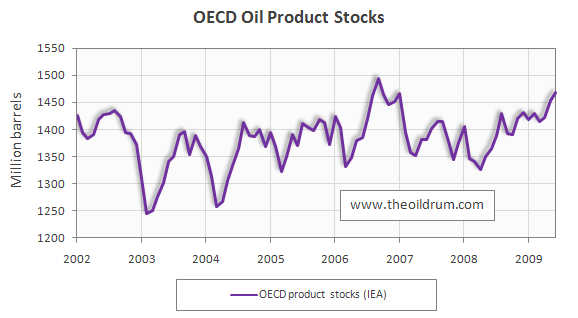Auntie_Cipation wrote:shortonsense wrote:newman1979 wrote: 60 months of data is conclusive IMO
So we're 4 years post peak.
How many decades before it effects traffic jams, do ya think? All those cars should run out of gasoline SOMETIME soon, shouldn't they?

You expected a plateau of only twenty minutes, perhaps?
I expect no plateau at all. The instantaneous slope of Hubberts bell shaped curve reaches 0 at only a single, infinitesimally small period of time, as dictated by the mathematics of any equation used to simulate the shape. 20 minutes might very well be small enough.
Auntie_Cipation wrote:if we had perfect foresight to understand all those forces, don't you think we would not be at all surprised to see that most things take time to play out?
Of course. This is a comment which appears to be gaining in popularity, the moreso as the span of time between peak oil and the present, becomes larger. It certainly wasn't the common assumption at the time.
http://www.bluegreenearth.us/archive/ar ... -2005.htmlAuntie_Cipation wrote:Although this was awkward to write, it's not really a complicated concept and I'm quite sure you understand what I'm saying.
Absolutely. The question is, to what extent is it revisionist history.
Auntie_Cipation wrote:So why in the world would you expect to see instantaneous effects to a situation that may still have years of wavering or wobbling before it starts a fast move?
Because it was expected at the time. And holding a prediction up to the reality of the situation, after the fact, is a reasonable way to determine whether or not the ideas which went into the prediction, in the past, have any validity.
You see, peakers disparaged economists and economic theory pretty heavily before peak oil arrived, often making ludicrous statements which completely ignored the expected results of demand destruction, as well as historical precedent of prior oil spikes and the recessions which often were in effect during the same time period. At the time, price could only go up, small drops in production ( 3-5%) would shut down food production, it was all starvation, all peak, all the time.
Now, peakers appear to be trying to say, "gee, well of COURSE demand destruction would mitigate against endless price increases"...when they gave no such credence to those who did put forward such basic economic concepts way back when. Go search on username "Spike", and read his posting history. Its Mike Lynch, and I don't believe he visits much any more, but he has a history which is available, and time stamped, right in this forum.
Auntie_Cipation wrote:If you truly believed that peak oil is a non-event, I think you would have something more compelling and authentic to say -- I've met some people who truly don't believe it, and while their arguments are naive, they're not disingenuous.
I'll assume the best for you and say "you can do better than this." If I'm wrong, then I'm truly sorry to hear that.
I truly believe that, as mentioned in this thread, peak oil is now 4 years old, and as best I can tell not a single tractor in America has stopped running for lack of fuel. Not a single plastics plant has shut down for lack of hydrocarbon feedstock. Not a single person has starved because Wal-Mart has not stocked their grocery shelves. Not a single NASCAR race has been postponed for lack of fuel, or inability to pay for it. Not a single airliner has fallen from the sky, no transpacific transport is adrift on the ocean for lack of fuel to get to port, no suburban zombies have taken over any American cities, there are no rolling permanent blackouts in North America, 90% of the worlds population hasn't died ( yes, I have the reference for Matts claim on this one right in front of me ) and on and on.
I am quite happy with the concept of a gradual transition towards the electrification of transport, and the availability of liquid transport fuels from other sources such as GTL because we have lots of natural gas on the planet, and I think these things are already happening, and quite obvious to anyone without blinders on.






